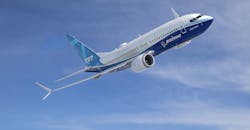US Prosecutor Calls FAA’s 737MAX Inspectors Unqualified
Federal investigators are due to report that some Federal Aviation Administration inspectors overseeing The Boeing Co.’s training standards for the 737 MAX and other commercial jet programs were unqualified for that assignment, and that FAA misled government officials examining the relationship between FAA and Boeing in the wake of the two fatal crashes that have idled the 737 MAX program.
The conclusions of the investigation have been reported to the Trump Administration and Congressional officials, according to broadcast reports.
The FAA certified the Boeing 737 MAX for commercial service in 2017. The latest version of the OEM’s top-selling narrow-body aircraft program, but it has been idled worldwide since a fatal crash of an Ethiopian Airlines flight in March. That followed the crash of a Lion Air flight in October 2018.
Investigators from the U.S. Office of Special Counsel were assigned to investigate the FAA’s approval of the 737 MAX program after a whistleblower charged the agency had not been thorough in its evaluation process.
In February of this year the FAA’s Office of Audit and Evaluation concluded that 16 of 22 safety inspectors did not complete formal training while 11 of the 16 lacked flight-instructor certificates.
In April the FAA told a Senate panel that all its inspectors working on Boeing 737 MAX pilot training and procedures had been qualified. While the FAA maintains that claim remains accurate, its assertion is contradicted by the Special Counsel report.
“The FAA is entrusted with the critically important role of ensuring aircraft safety,” Special Counsel Henry J. Kerner stated. “The FAA’s failure to ensure safety inspector competency for these aircraft puts the flying public at risk.”
The Special Counsel’s position may delay the 737 MAX’s return to service, as the FAA remains involved with Boeing as it prepares to return the aircraft to service. Boeing has defined and developed an updated flight-control software, with FAA oversight, that it expects will correct the cause of the two crashes.
Boeing further expects the agency and air-safety boards in Europe and elsewhere to approve the software revisions in order to earn authorization to reprogram the idled fleet, and to approve returning the jets to service.
